|
2 hours to humiliate Falstaff 3 times to general merriment. Jealous husbands, but all ends well. Based on Shakespeare. |
|
The favoured wine of the Elizabethans was strong, sweet, white wine: muscadine, malmsey, and sack [sherry]--and they even added sugar to these already sweet wines. (One of Falstaff's nicknames was "Sir John Sack-and-sugar.") Wine was imported from France, Germany, and the Canary Islands, and sold by the barrel--rundlets, hogsheads, butts and pipes...
Verdi's Falstaff
In his sole comedy about the rotund Sir John Falstaff, Shakespeare unwittingly laid the groundwork for one of the world's most beloved operas, Giuseppe Verdi's Falstaff. (The poet W. H. Auden went so far as to declare in his "Lectures on Shakespeare" that the opera alone redeems the play, which Auden considered insubstantial.)
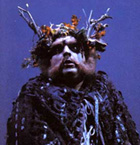 Verdi was 76 when he began work on the score for Falstaff in 1889. Keenly aware of his age and waning physical powers, he hesitated to embark on the work-yet he yearned to undertake an "opera buffa," and he had always been fascinated by the figure of Falstaff. To his longtime librettist, Arrigo Boito, who had first proposed Merry Wives to Verdi and had recently drafted a libretto, the composer confided, "In outlining Falstaff, have you ever thought of my enormous weight of years? I know that in replying, you will exaggerate the robust state of my health. But even if it is as you say, you must agree that in taking on such a task I may over-tax my strength. What if I could not stand the strain? What if I could not finish the music?"
Verdi was 76 when he began work on the score for Falstaff in 1889. Keenly aware of his age and waning physical powers, he hesitated to embark on the work-yet he yearned to undertake an "opera buffa," and he had always been fascinated by the figure of Falstaff. To his longtime librettist, Arrigo Boito, who had first proposed Merry Wives to Verdi and had recently drafted a libretto, the composer confided, "In outlining Falstaff, have you ever thought of my enormous weight of years? I know that in replying, you will exaggerate the robust state of my health. But even if it is as you say, you must agree that in taking on such a task I may over-tax my strength. What if I could not stand the strain? What if I could not finish the music?"
At the same time, Verdi could not suppress his enthusiasm for the project. "What a joy to be able to say to the public, 'Here we are again!! Come and see us!'"
Boito's soothing response struck the right note, and days later Verdi began composing the opera. It's easy to see why. Boito's argument-like Falstaff's wily charms-proved irresistible.
"I don't think you will find writing a comic opera fatiguing," Boito had written. "A tragedy makes its composer really suffer. His mind dwells on grief, and his nerves become unhealthily agitated. But the jests and laughter of comedy exhilarate both mind and body. You have longed for a good subject for a comic opera all your life, which proves you have a natural aptitude for the noble art of comedy. Instinct is a good guide. There is only one way to end your career more splendidly than with Otello, and that is to end it with Falstaff."
And so Verdi did. The opera's final quatrain, sung by the whole company, captures Falstaff's buoyant approach to life: "Tutto nel mondo è burla" ("everything in the world is a joke").
The Play: History and Sources
If John Dennis and Nicholas Rowe are to be believed, Shakespeare wrote The Merry Wives of Windsor in a mere two weeks at the command of Queen Elizabeth I, who reportedly told the playwright that she "was so well pleased with the admirable character of Falstaff, in the two parts of Henry IV," she wished Shakespeare to revive him "for one play more, and to show him in love."
That account, as given first by Dennis in the dedication to his 1702 play The Comical Gallant, an adaptation of Merry Wives, and again by Rowe in the introduction to his 1709 edition of Shakespeare's works, has stuck to the play for centuries and bedeviled more than one scholar.
Far more probable, as Giorgio Melchiori writes in his introduction to the Arden Shakespeare edition of Merry Wives, is that the play "was conceived and written as a royal entertainment to be performed at the feast held in Westminster Palace on St. George's Day, April 23, 1597, to celebrate the election of five new knights (one of them being George Carey, Lord Hunsdon, the patron of Shakespeare's company) to the Order of the Garter."
Both the main plot of Merry Wives-a variation on the stock situation of a husband duped by a clever lover, and its various subplots, each involving some form of hoax-bear traits of Italian comedy. The work as a whole may stem from an Italian novella, possibly Sir Giovanni Fiorentino's Il pecorone, a work Shakespeare is known to have used in drafting The Merchant of Venice. But in its execution, the comedy is wholly Shakespeare's, a supreme example of the craft of playwriting, what critic Muriel Bradbrook calls "one of the most thoroughly professional jobs in the English theater."
Salieri's Falstaff
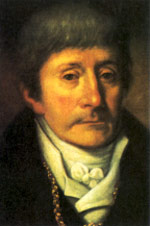 "Antonio Salieri (1750-1825) was a thoroughly competent professional composer, despite his unfortunate fictitious reputation, perpetuated by Rimsky Korsakov and Peter Shaffer. His Falstaff is frankly populist in its aim, but has quite a few special effects in the orchestration, with solos for cello and clarinet. After a slowish start one gradually becomes involved in the considerable subtlety of the text, which is available in subtitled translations in several languages.
"Antonio Salieri (1750-1825) was a thoroughly competent professional composer, despite his unfortunate fictitious reputation, perpetuated by Rimsky Korsakov and Peter Shaffer. His Falstaff is frankly populist in its aim, but has quite a few special effects in the orchestration, with solos for cello and clarinet. After a slowish start one gradually becomes involved in the considerable subtlety of the text, which is available in subtitled translations in several languages.
 This production at the little rococo theatre in Schwetzingen Palace is ideal for home viewing. The sets are simplified but fully adequate to suggest the different scenes, the costumes are muted in colour and all the emphasis is upon inventive acting based on excellent teamwork and fine singing. John de Carlo as Falstaff gives a marvellous characterisation of this archetypal figure, who is easily inveigled to bounce back and hasten to another certain humiliation, for us to relish in anticipation and delivery. A cruel story about total denial of personal shortcomings and enduring confidence in certain reciprocation of his roving sexual fancies.
This production at the little rococo theatre in Schwetzingen Palace is ideal for home viewing. The sets are simplified but fully adequate to suggest the different scenes, the costumes are muted in colour and all the emphasis is upon inventive acting based on excellent teamwork and fine singing. John de Carlo as Falstaff gives a marvellous characterisation of this archetypal figure, who is easily inveigled to bounce back and hasten to another certain humiliation, for us to relish in anticipation and delivery. A cruel story about total denial of personal shortcomings and enduring confidence in certain reciprocation of his roving sexual fancies.
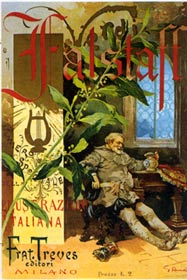 It is a joy to watch and the direction for stage (Michael Hampe) and for the TV cameras is ideal. The understatement of the stage picture benefits from the high quality of DVD screen viewing. In summary, it is an opera which looks good on screen and is far more enjoyable with vision than would be possible on CD.
It is a joy to watch and the direction for stage (Michael Hampe) and for the TV cameras is ideal. The understatement of the stage picture benefits from the high quality of DVD screen viewing. In summary, it is an opera which looks good on screen and is far more enjoyable with vision than would be possible on CD.

|


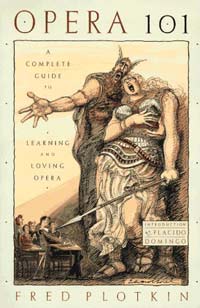

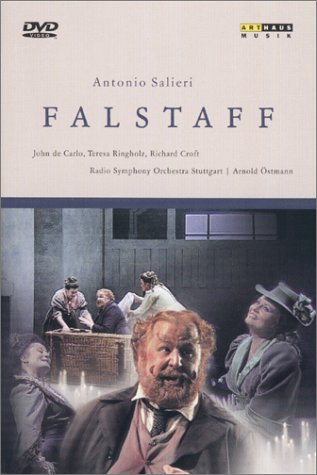

 View great Shakespeare movies
View great Shakespeare movies 



